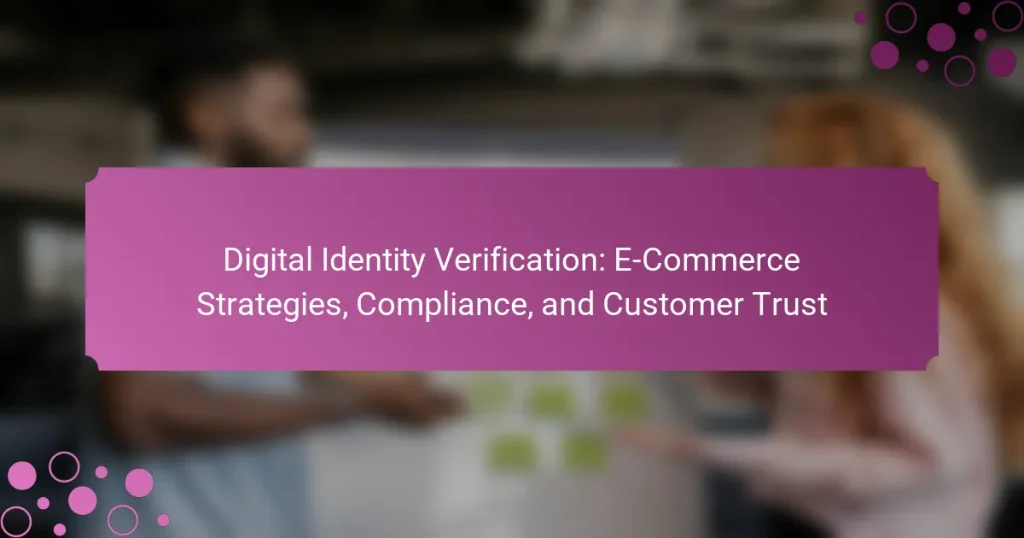Digital identity verification is a crucial process that ensures individuals are who they claim to be, utilizing methods such as document validation and biometric data checks. In the UK, leading solutions like Onfido, Veriff, and Jumio provide businesses with the tools necessary to enhance security and comply with regulatory standards. By implementing these verification systems, organizations can significantly reduce fraud and protect both themselves and their customers.
Biometric vs Document-Based Verification: Accuracy, Security, and User Experience
AI in Digital Identity Verification: Automation, Accuracy, and Fraud Prevention
Digital Identity Verification: E-Commerce Strategies, Compliance, and Customer Trust
Multi-Factor Authentication: Effectiveness, User Adoption, and Security Benefits
Digital Identity Verification Provider: Selection Criteria, Features, and Support
Digital Identity Verification Compliance: Regulations, Standards, and Best Practices in Europe
What are the best digital identity verification solutions in the UK?
The best digital identity verification solutions in the UK include Onfido, Veriff, IDnow, Jumio, and Trulioo. These platforms offer various features tailored to meet compliance requirements and enhance security for businesses and consumers alike.
Onfido
Onfido is a widely used identity verification solution that combines AI technology with human expertise. It allows businesses to verify identities through government-issued IDs and biometric checks, ensuring a high level of accuracy and security.
Onfido’s platform is designed to streamline the onboarding process, making it suitable for sectors like finance and e-commerce. Its compliance with UK regulations, including GDPR, helps businesses maintain trust and security.
Veriff
Veriff specializes in providing identity verification services that focus on user experience and security. It supports a wide range of documents from various countries, making it versatile for international businesses.
With real-time verification and a user-friendly interface, Veriff minimizes friction during the onboarding process. Its robust fraud detection capabilities are essential for industries such as online gaming and fintech.
IDnow
IDnow offers a comprehensive identity verification solution that includes video identification and electronic signatures. This service is particularly useful for sectors requiring strong compliance measures, such as banking and insurance.
The platform is designed to meet EU regulations, ensuring that businesses can operate securely within the UK market. IDnow’s flexibility allows for both automated and manual verification processes, catering to different business needs.
Jumio
Jumio provides identity verification services that leverage AI and machine learning to enhance accuracy. Its solutions are designed to reduce fraud and improve customer onboarding times across various industries.
Jumio’s platform supports multiple document types and offers real-time verification, making it suitable for businesses that prioritize speed and security. Compliance with UK regulations further strengthens its appeal in the market.
Trulioo
Trulioo is a global identity verification provider that offers access to a vast database of identity information. Its services are particularly beneficial for businesses operating in multiple countries, including the UK.
Trulioo’s platform enables businesses to verify identities quickly and efficiently while remaining compliant with local regulations. Its extensive network of data sources helps ensure high accuracy and reduces the risk of fraud.
How does digital identity verification work?
Digital identity verification works by confirming an individual’s identity through various methods, ensuring that the person is who they claim to be. This process typically involves validating documents, biometric data, and cross-referencing information against secure databases.
Document verification
Document verification involves checking the authenticity of identity documents such as passports, driver’s licenses, or national ID cards. This can include examining security features like holograms, watermarks, and barcodes to ensure they are genuine.
Many services utilize optical character recognition (OCR) technology to extract data from documents, which is then compared against official records. It’s crucial to ensure that the documents are not expired and match the individual’s personal details.
Biometric verification
Biometric verification uses unique physical characteristics, such as fingerprints, facial recognition, or iris scans, to confirm identity. This method is increasingly popular due to its high accuracy and difficulty to forge.
When implementing biometric verification, consider the technology’s compatibility with existing systems and the privacy implications. Users should be informed about how their biometric data will be stored and used, adhering to regulations like GDPR in Europe.
Database checks
Database checks involve cross-referencing an individual’s information against various databases, such as government records, credit bureaus, or watchlists. This step helps verify the authenticity of the identity and detect any potential fraud.
Organizations should ensure they have access to reliable and up-to-date databases to perform these checks effectively. It’s also important to comply with local data protection laws when accessing and using personal information for verification purposes.
What are the benefits of digital identity verification?
Digital identity verification offers numerous advantages, including improved security, reduced fraud, and adherence to regulatory requirements. By confirming the identity of individuals online, businesses can protect themselves and their customers from various risks.
Enhanced security
Enhanced security is a primary benefit of digital identity verification. By utilizing advanced technologies such as biometrics and two-factor authentication, organizations can significantly reduce the risk of unauthorized access to sensitive information. This multi-layered approach ensures that only verified individuals can access critical systems and data.
For example, financial institutions often implement identity verification processes that require users to provide a fingerprint or facial recognition in addition to their passwords. This added layer of security helps safeguard against identity theft and data breaches.
Fraud prevention
Fraud prevention is another crucial advantage of digital identity verification. By accurately verifying identities, businesses can detect and prevent fraudulent activities before they occur. This is especially important in sectors like e-commerce and banking, where the potential for fraud is high.
Implementing robust identity verification measures can lead to a significant decrease in fraudulent transactions, often reducing fraud rates by tens of percent. Companies can also benefit from lower chargeback rates and improved customer trust as a result of these preventive measures.
Regulatory compliance
Regulatory compliance is essential for businesses operating in many industries. Digital identity verification helps organizations meet legal requirements related to Know Your Customer (KYC) and Anti-Money Laundering (AML) regulations. By verifying customer identities, companies can avoid hefty fines and legal repercussions.
In the European Union, for instance, the General Data Protection Regulation (GDPR) mandates strict guidelines for handling personal data. Digital identity verification solutions can assist businesses in adhering to these regulations while ensuring that customer information is securely processed and stored.
What are the challenges of implementing digital identity verification?
Implementing digital identity verification presents several challenges, including data privacy concerns, integration with existing systems, and user experience issues. Addressing these challenges is crucial for organizations to ensure secure and efficient identity verification processes.
Data privacy concerns
Data privacy is a significant challenge in digital identity verification, as organizations must handle sensitive personal information. Compliance with regulations such as the General Data Protection Regulation (GDPR) in Europe or the California Consumer Privacy Act (CCPA) in the United States is essential to protect user data.
To mitigate risks, companies should adopt strong encryption methods and limit data access to authorized personnel only. Regular audits and transparency with users about data usage can also help build trust.
Integration with existing systems
Integrating digital identity verification solutions with existing systems can be complex and resource-intensive. Organizations often face compatibility issues with legacy systems, which may require significant modifications or upgrades.
To ease integration, businesses should choose solutions that offer APIs and support various platforms. Conducting a thorough assessment of current systems before implementation can help identify potential challenges and streamline the integration process.
User experience issues
User experience is critical for the success of digital identity verification solutions. Complicated verification processes can lead to user frustration and abandonment. Ensuring a seamless and intuitive interface is vital.
To enhance user experience, organizations should focus on minimizing the number of steps required for verification and providing clear instructions throughout the process. Offering multiple verification methods, such as biometric options or one-time passwords, can also improve accessibility and satisfaction.
What criteria should businesses consider when choosing a digital identity verification provider?
Businesses should evaluate several key criteria when selecting a digital identity verification provider, including compliance with regulations, technology compatibility, and cost-effectiveness. These factors ensure that the chosen solution meets legal requirements, integrates seamlessly with existing systems, and fits within budget constraints.
Compliance with regulations
Ensuring compliance with regulations is crucial for any digital identity verification provider. Businesses must verify that the provider adheres to relevant laws such as the General Data Protection Regulation (GDPR) in Europe or the California Consumer Privacy Act (CCPA) in the United States. Non-compliance can result in hefty fines and reputational damage.
Additionally, consider industry-specific regulations, such as those in finance or healthcare, which may impose stricter identity verification standards. A provider that is well-versed in these regulations can help mitigate risks associated with identity fraud and data breaches.
Technology compatibility
Technology compatibility is essential for a smooth integration of digital identity verification solutions into existing systems. Businesses should assess whether the provider’s technology can easily interface with their current platforms, such as customer relationship management (CRM) systems or payment processors. This ensures a seamless user experience and operational efficiency.
Moreover, consider the scalability of the technology. As your business grows, the verification solution should be able to handle increased volumes without compromising performance. Providers that offer flexible APIs or customizable solutions can be advantageous in this regard.
Cost-effectiveness
Cost-effectiveness is a critical factor when choosing a digital identity verification provider. Businesses should evaluate not only the upfront costs but also any ongoing fees associated with the service. Look for transparent pricing models that clearly outline costs for various features and usage levels.
Additionally, consider the potential return on investment (ROI) from implementing the solution. A more expensive provider may offer superior technology or compliance features that reduce the risk of fraud and associated losses, ultimately making it a more cost-effective choice in the long run.
What are the local regulations affecting digital identity verification in the UK?
In the UK, digital identity verification is primarily governed by the General Data Protection Regulation (GDPR) and the Data Protection Act 2018. These regulations set strict guidelines on how personal data should be collected, processed, and stored, ensuring that individuals’ privacy is protected during the verification process.
Key Regulations Impacting Digital Identity Verification
The GDPR requires organizations to obtain explicit consent from individuals before processing their personal data. This means that businesses must clearly inform users about what data is being collected and how it will be used. Additionally, the Data Protection Act 2018 reinforces these principles and includes provisions specific to the UK context.
Organizations must also comply with the Privacy and Electronic Communications Regulations (PECR), which govern the use of cookies and similar technologies for tracking user consent. This is particularly relevant for online identity verification services that rely on cookies to enhance user experience.
Compliance Requirements for Businesses
To comply with these regulations, businesses must implement robust data protection policies and ensure that their identity verification processes are transparent. This includes conducting Data Protection Impact Assessments (DPIAs) to identify and mitigate risks associated with data processing activities.
Moreover, organizations should provide users with easy access to their data and the ability to request corrections or deletions. Regular training for staff on data protection principles is also essential to maintain compliance and protect customer information.
Best Practices for Digital Identity Verification
When implementing digital identity verification, businesses should adopt best practices such as using multi-factor authentication to enhance security. This adds an additional layer of verification, making it harder for unauthorized users to access sensitive information.
It’s also advisable to regularly review and update verification technologies to keep pace with evolving threats. Engaging with reputable identity verification providers can help ensure compliance with local regulations while maintaining high security standards.






